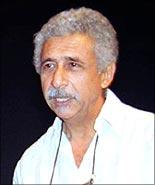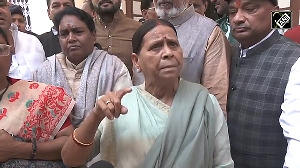 In the first part of the interview, Naseeruddin Shah spoke about his directorial debut, Yun Hota Toh Kya Hota, which is scheduled to release in July.
In the first part of the interview, Naseeruddin Shah spoke about his directorial debut, Yun Hota Toh Kya Hota, which is scheduled to release in July.
But the making of YHTKH is not the only thing that is on Naseer's mind. The actor will be part of Subhash Ghai's filmmaking institute -- Whistling Woods -- when it starts in July.
And though Naseer will supervise the acting department, he does not think much of acting institutes as such. Over to Naseer:
What brings you to Whistling Woods?
I will be conducting the acting department, which is helping in formulating the syllabus and actually conducting classes. I'm at the moment in the process of finalising the faculty that would be assisting me.
How often would you be able to give time to the institute?
![]()
More on rediff.com!
![]()
![]()
![]()
![]()
Actresses making comebacks!![]()
Puthupettai, shortened in theatres![]()
Your fave horror movie?![]()
![]()
![]()
As often as I can. I don't have too many commitments for the next six months, so I've committed myself only for six months to start with, till the end of the first term. And then I'm going to have to weigh my options. But I certainly did want to take to teaching. I don't know if it will be practical for me to take to it full-time. But I have been teaching off and on over the last 15 years, and both enjoyed and benefitted greatly from the teaching. I don't know if any of the students (I have taught) have benefitted, but I've learnt a lot.
How do you see this institute as different?
It's much better equipped technically and in every other way, infrastructure-wise. Kids will have access to the hands-on experience of handling equipment, which they will be using in future. They won't have to handle archaic cameras as they have to do at FTII and so on, in each department -- whether it's camera, sound or edit.
As far as the acting department is concerned, my desire is to produce a generation of actors who are not only going to be very good performers. It goes without saying that they should be that: if they are short on skills, they have to be helped to develop those skills, and if they are skilful, they have to learn how to nurture and use those skills. But my dream is to produce a generation of actors who realise what the function of an actor in a movie is supposed to be.
I think our cinema has stayed in its adolescent stage largely because of our obsession with and our dependence upon stars to make our movies. The stars, being only too human, realise that this is the case, and so they milk it for whatever it's worth, and who can blame them? But the whole system is sick, and it needs treatment. It needs many succeeding generations of actors who know for certain what their function in a movie is. And to drive home to them that they have to know their craft, without doubt, but they have also to realise that to show off their abilities is not why a film is made.
What I'm talking of -- and this is very ambitious -- is to try and alter a mindset which has been ruling our industry since it began. Not since it began, but since the 1950s or so. When the stars became very big and the whole purpose of making a movie was so that you could get this star into it. Actors have to learn that they are as important to a movie as the camera is, as important as the sound is, and less important than the script is. No actor is bigger than the movie: this is something that has to be driven home to these kids. Along with developing their skills as performers and their understanding of the craft of acting. That's my dream; let's see what happens.
How much acting can actually be taught?
Acting is learnt, not taught. I can only help the students learn. There are no formulae, no textbooks, no foolproof technique. There are as many methods of acting as there are human beings on this earth. What can be taught to students is how to channelise their imagination. How to use their time fruitfully. And to appreciate the gifts they have.
It's very true: Acting is not taught, it's learnt. There are so many actors who are great actors without going to any institute. But this does not mean they are not educated actors. They have educated themselves.
Why would anyone assume -- it's a fallacy enough in the acting world -- that acting doesn't require riyaaz? See, only actors dare to perform without practising. Without cleaning their instrument, without caring for their instrument. No musician, no singer, no dancer would ever dare do that. They consider it their duty to wake up and practice every morning. Actors don't consider it their duty, and yet they feel entitled to act.
If students come here with the dream of becoming stars, there's nothing I can do about that. What I can do is show them another direction too. Nothing wrong with becoming a star and becoming rich. Okay, good on you. Become a star. No problem with me.
But if your aspirations end there, because if you want something very badly, you'll get it. If you really want to become a star, you will. Make sure your aspirations don't just end there, at a fancy car and a fancy house and an air-conditioned existence. Aspire higher and higher. To what? To learning about your craft.
When you formulate a syllabus for something like this, don't you have to keep a lot of flexibility? Seeing that there obviously is no right way or wrong way?
You experiment everyday. Every day is a new day, and a new discovery. I'm realising now, 15 years after having begun teaching at the institute and at NSD, all the things I've been doing wrong.
Teachers have to guard against a lot of things. The temptation to play God, first of all, particularly if they have adoring students.
And I'm not unaware of my reputation as an actor. People look at me with a certain regard. I am well aware of it, and it's something I have no control over. So for someone like me, the temptation to play God would be greater, and I could fall into those traps, and a lot of the time I have seen that acting teachers, instead of guiding the students, end up displaying their own wares half the time, which is not what a teacher is supposed to do.
Lots of acting institutes have mushroomed up over the last few years.
I don't want to talk about any of them. They're not worth two puffs of my breath. They're all con games run by failed actors -- let me not say that, somebody may sue me for libel.
Well, you're not naming anyone, so you should be safe...
(Laughs) Well, lets say most of them are con-games. Pure and simple con games run by failed actors. I'm amazed at the gullibility of the students who go there. And it leads me towards a very disturbing realisation, which I have always suspected is true, that a lot of actors -- learning actors and working actors -- are content to listen to bullsh-- and pretend they have heard wisdom.
It's very difficult to pin an actor down and define his work. A writer can define his work. A painter can. A carpenter can. A blacksmith can. Why can't an actor? Because most of the time, an actor doesn't know what his work consists of. And so that is the concern. To make sure that these kids are not subjected to bullsh--.
Actors swallow bullsh-- very easily. No actor will be willing to listen to you if you criticise his work, but he'll be willing to listen to you all night if you praise him. And to tell an actor a whole lot of crap like 'when you act something takes control of you and some magic just happens' -- this is the kind of stuff that's taught to these kids at these acting schools.
Or they're taught nothing at all. They are played Hindi film songs and told to dance to that, which they enjoy doing anyway. That's why these kids pay through their noses and attend a course for three months and go back home thinking they have learnt something about acting. I have the deepest contempt for that kind of stuff.
Who would you call an ideal entrant for this course? There are quality institutions in the country, like those you mentioned, the NSD and the FTII. Who should come here?
Anybody who wants to learn about the trade and who, we feel, is qualified to do so.
The acting course, for example, has no upper age limit. It has a minimum age limit -- I'm not going to accept a 15-year-old kid because he doesn't know what he really wants, but I don't mind a 60-year-old guy who wants to learn about acting. Sure. And if you really want to do it, you will.
I had insisted on graduation [as a minimum age], they have kept it at Class XII. But what you need more than college degrees is life experience. And a burning desire to learn the craft. And it's true that most kids, when they decide to become actors, do not have any burning desire of that kind, except to become famous. So, while not puncturing their dreams of becoming famous, one must introduce something to their life that it may become a little more of use to others and to themselves, not to mention the business around them.
But for a young student, who could go in for either of the institutes I just mentioned, what are the criteria they should keep in mind?
They must want to do it very badly. The educational qualifications are a technical matter, but they must want it very bad.
What I advise young actors who come to me -- sometimes brought by their parents, sometimes they come on their own -- what I say is that there is no advice you can give an actor on what he should do. The only thing he can do is improve himself. And answer this question that he should ask himself, as far as acting is concerned, that does acting mean enough to me that I would rather die than not do it?
And I'm speaking literally, I'm not talking in metaphorical terms. That I would rather die than not be an actor. Because I remember this is what I felt when I was 13 or 14 and decided to be an actor. I knew it would not be easy. I knew I'd face protests, obstacles, rejections -- apart from the fear of failure. But I knew that if I could not do this, I don't want to live anymore.
For actors, that's the criteria: Only if you are certain that this is the job you were born to do, and you would rather die than not do it, should you step into the world of acting.






 © 2025
© 2025